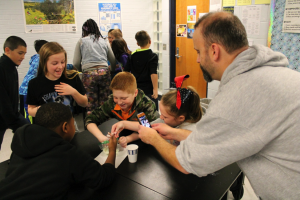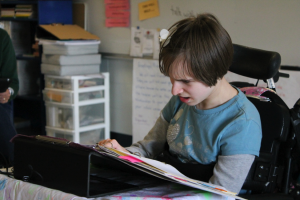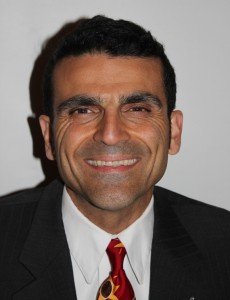 “Every child is born a genius, but is swiftly degeniused by unwitting humans and/or physically unfavorable environmental factors.”
“Every child is born a genius, but is swiftly degeniused by unwitting humans and/or physically unfavorable environmental factors.”
– Buckminster Fuller
When I entered Todd Bloch’s science class, in Woods Middle School, I was immediately captivated by the high energy and dynamic learning environment. Students were so involved in hands-on, minds-on learning that I found myself yearning to sit right down and join them.
The 6th graders were motivated by the chance to get messy as they learned about changing states of matter, by mixing corn starch and water to make oobleck, the mythical substance of Dr. Seuss fame. All the kids were fully engaged in a way that enabled them to feel the changing states of matter, not just intellectualize them.
In a nearby 7th grade science class, students used their choice of media to depict mitosis in animal cells. The opportunity to access their preferred learning modality–whether text based, visual or musical–afforded kids the opportunity to represent content in exciting ways. Students showcased their design skills through comic book creation, or their lyrical talents through rap. Again, it was evident that students were accessing the content in ways that resonated best with them, and enabled them to display their learning both creatively and thoughtfully.
As I spent the day at the school, I was keenly aware of Buckminster Fuller’s principle of geniuses. By the end of the afternoon I realized that this school brims with the kind of engaged teaching and learning that recognizes the genius inherent in every child.
Accessing Genius in Every Child
 As a career reading and writing teacher, I was utterly impressed by the students in a writing workshop who were taking turns sharing personal narrative pieces in their weekly author’s chair. These students were extraordinary in their passionate writing and dynamic storytelling. The fact that they all had very significant learning differences made me realize that with effective, dedicated instruction, their voices can be heard as easily as those of students in a regular education setting.
As a career reading and writing teacher, I was utterly impressed by the students in a writing workshop who were taking turns sharing personal narrative pieces in their weekly author’s chair. These students were extraordinary in their passionate writing and dynamic storytelling. The fact that they all had very significant learning differences made me realize that with effective, dedicated instruction, their voices can be heard as easily as those of students in a regular education setting.
All children are born geniuses. All children.
I was struck with the realization that everyone has stories to tell and that everyone’s voice matters. A highlight came when one of the students asked me to read his story aloud for him. Initially I hesitated, as I’d never met this child before. My first instinct was to reply, “Me? Are you sure you want me to read it?” Instead, I took a breath and said, “Sure, I’d be happy to!”
I read that boy’s story with enthusiasm and passion in a way that pleased both him and his classmates, based on the wide smiles on their faces. It was one of the best parts of my entire day. I was humbled by the enthusiasm the students displayed as they listened intently, with great joy. I left the room overwhelmed.
I am confident that at Warren Woods Middle School, students are motivated, uplifted, and above all else, valued for who they are and what they bring to their learning environments each day. Their myriad intelligences are valued and employed. They are able to demonstrate and live their geniuses.
 Rick Joseph is a National Board Certified Teacher and has taught 5/6 grade at Covington School in the Birmingham Public School district since 2003. Prior, he served as a bilingual educator and trainer for nine years in the Chicago Public Schools. Rick is thrilled to serve as the 2016 Michigan Teacher of the Year. Through Superhero Training Academy, Rick’s students have created a superhero identity to uplift the communities where they learn and live.
Rick Joseph is a National Board Certified Teacher and has taught 5/6 grade at Covington School in the Birmingham Public School district since 2003. Prior, he served as a bilingual educator and trainer for nine years in the Chicago Public Schools. Rick is thrilled to serve as the 2016 Michigan Teacher of the Year. Through Superhero Training Academy, Rick’s students have created a superhero identity to uplift the communities where they learn and live.

 Audience: teachers in all content areas grades 6-12
Audience: teachers in all content areas grades 6-12